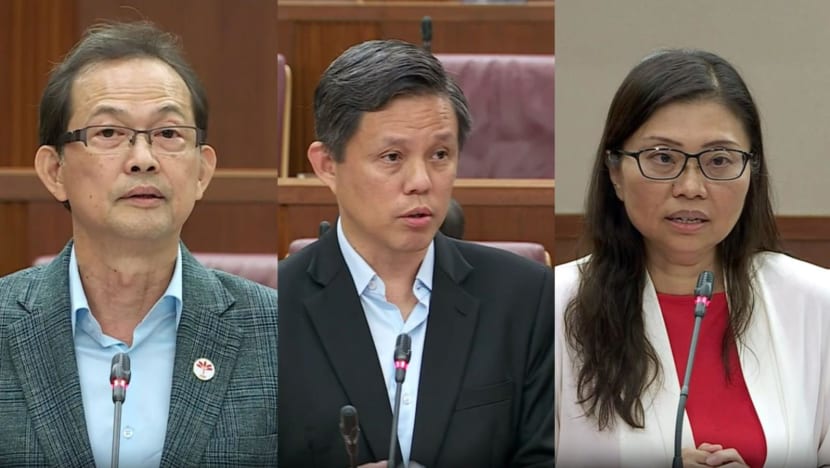www.channelnewsasia.com
Singapore
Parliament votes against Progress Singapore Party's motion to abolish GRCs
Supporting the motion would risk having no or inadequate multiracial representation in the highest legislative body of the land, said Minister-in-charge of the Public Service Chan Chun Sing.
Progress Singapore Party (PSP) NCMPs Leong Mun Wai and Hazel Poa in a debate with Minister-in-charge of the Public Service Chan Chun Sing on a motion to abolish the Group Representation Constituency (GRC) system.


&
Tang See Kit
05 Jul 2023 11:42PM (Updated: 05 Jul 2023 11:53PM)
SINGAPORE: Parliament on Wednesday (Jul 5) voted against a motion tabled by the Progress Singapore Party (PSP) to abolish the Group Representation Constituency (GRC) system,
with many Members of Parliament – including Nominated MPs and those from the Workers’ Party – saying the system should stay as there is still a risk of racially charged politics.
The GRC system was introduced in 1988 to ensure ethnic minority representation in parliament. Parties are required to field at least one non-Chinese candidate in a GRC team during elections.
Minister-in-charge of the Public Service Chan Chun Sing told the House in a 40-minute speech that GRCs serve to always ensure that parliament would be representative of Singapore's racial makeup and that politics does not become racially charged.
To support the PSP’s motion would be to go against the country’s founding philosophy of ensuring that the interests of minority communities are met, and to “risk having no or inadequate multiracial representation in the highest legislative body of the land”, added Mr Chan, who is also the Education Minister.
MP Murali Pillai (PAP-Bukit Batok) was one of those who rose to speak in a debate that lasted almost four hours. He recounted his personal experience as a candidate in his Single Member Constituency (SMC) in 2016 and 2020.
If the GRC system were abolished, Singapore would face a scenario in which “good people from minority races … may just decide this is too much trouble and not run for elections”, he argued.
He showed fellow MPs a 2020 General Election flyer used in his campaign that had been defaced. The Chinese character for “die” had been scrawled over his chest and hands in the flyer.
Mr Pillai told the House: “I feel it significant for me to share that when I stood for elections in Aljunied GRC in 2015, I certainly did not see similar attempts at racial politicisation. I personally think the reason for this is attributable to the fact that I stood as part of a team in a GRC.
“It would be difficult for any person to exploit matters along racial lines during elections when the political parties in the contest fielded minority candidates in their respective teams,” he added.

GRC HAS SEVERAL “SUB-OPTIMAL OUTCOMES”: PSP
In tabling the motion, PSP’s non-constituency MP (NCMP) Hazel Poa said that the GRC system has generated several “sub-optimal” outcomes.
These include allowing weaker candidates to ride on the coattails of more established or popular candidates, voters “being held to ransom to vote for ministers”, and hampering the country’s political development by “setting higher and higher hurdles” for the opposition parties.
Ms Poa also raised the point about unfilled vacancies when GRC MPs resign. With
no requirement under the law for a by-election to be called if an MP of a GRC resigns, this has resulted in residents being underserved and underrepresented, she said.
She cited the example of
Senior Minister Tharman Shanmugaratnam’s intention to run for the Singapore presidency, a move that will see him step down from his position as MP in the five-member Jurong GRC. Similarly, current President Halimah Yacob had to resign as Marsiling-Yew Tee GRC MP to stand in the 2017 Presidential Election.
Ms Poa likened such moves to breaking a promise.
"Running in a General Election is an inherent promise to serve the residents for a term of five years," she argued. "It is therefore troubling if such broken promises were to occur at regular intervals."
She added that there are other ways to ensure adequate minority representation in parliament without the problems that come with the GRC system.
Ms Poa proposed a variation of the current Non-Constituency MP scheme, where in the event of an under-representation of minorities in parliament, the best-performing losers who are minority candidates can be appointed NCMPs.
She also proposed a form of a proportional representation system, where a party that obtains 10 per cent of the national vote would, for example, be allocated about 10 per cent of the seats.
While the aim of ensuring minority representation in Parliament through Group Representation Constituencies (GRCs) is laudable, the system has generated several “sub-optimal” outcomes, said NCMP Hazel Poa. These include… voters being “held to ransom” to vote for Government ministers, weaker candidates riding on the coat-tails of stronger ones, and unfilled vacancies leading to residents being underserved and under-represented. The last point is particularly pertinent when the MP who has resigned is the minority representative of the GRC, she said. This is happening in Jurong GRC with Senior Minister Tharman Shanmugaratnam’s decision to contest in the next Presidential Election. The same thing took place when current President Halimah Yacob ran for office. Ms Poa asked if the PAP intends to regularly repeat this, saying it is analogous to one party changing the terms of a contract unilaterally while the other party is bound to the deal until expiry. Moving a motion in Parliament on Wednesday (Jul 5) calling for the abolition of GRCs, Ms Poa said the Progress Singapore Party (PSP) is confident that Singaporeans do not vote along racial lines and that minority candidates are well able to win elections on their own merits. She made two alternative suggestions to the GRC system. The first is an NCMP scheme for minorities.
All candidates, including minority ones, would contest in Single Member Constituencies (SMCs). If enough minority candidates are elected, the scheme does not kick in. If not, losing minority candidates with the highest percentage of votes would be appointed as NCMPs. This system, said Ms Poa, is familiar and would require minimal disruption to the current model. The second suggestion is to adopt some form of proportional representation. This would be adapted to ensure minority representation by stipulating a multiracial slate for SMC contests and a multiracial party list of candidates. Each party must pick from the list to meet minimum racial representation requirements. Ms Poa said this suggestion will require more time and consideration. She noted that PSP’s intention is not to call for immediate action but for thought and discussion, which is possible with the next General Election being two years away. see more
Citing examples of such a system in the likes of Germany and New Zealand, Ms Poa suggested that this can be adapted to ensure minority representation “by stipulating a multi-racial slate for SMC contests and a multi-racial party list”.
Each party must select from the list to meet minimum racial representation requirements, she added.
In a separate speech, fellow PSP NCMP Leong Mun Wai said that the ruling People’s Action Party (PAP) has regularly made changes to the GRC system to “entrench its political dominance”.
For example, the GRC system was expanded to a maximum of six members from the 1997 General Election onwards. This came on the back of the opposition winning an unprecedented four parliamentary seats in the 1991 polls, Mr Leong said.
While then-Prime Minister Goh Chok Tong had attributed the change to the set-up of community development councils which needed economies of scale and a critical mass of residents, Mr Leong said “many Singaporeans, including myself, have never been convinced by this reasoning”.
Adding that the councils could instead be formed by six adjoining SMCs or two three-member GRCs, he argued that “many Singaporeans believed that the PAP government expanded GRC sizes to hamper the opposition’s electoral chances”.
Mr Leong also noted several ways that GRCs could be used to maximise the PAP’s political advantages.
One of which includes how the varying sizes of GRCs provide “maximum flexibility” for the Electoral Boundaries Review Committee (EBRC) “to redraw boundaries in a way that can be advantageous for the ruling party”.
He pointed out that since 1988, SMCs that have been absorbed into GRCs - such as Braddell Heights, Bukit Batok and Changi - have had a higher average vote share for the opposition than the average SMC.
“Only SMCs and GRCs that the opposition have won are consistently spared from changes in their electoral boundaries,” said Mr Leong.
The GRC system “ought to be regarded as one of the most undesirable electoral rules in the world”, he added.
Singapore’s Group Representation Constituency system “ought to be regarded as one of the most undesirable electoral rules in the world”, said NCMP Leong Mun Wai in Parliament on Wednesday (Jul 5). Elaborating on the… history of the system, he said “many Singaporeans believe” that the PAP Government expanded GRC sizes over the years to hamper the opposition’s electoral chances. Mr Leong said the varying sizes of GRCs provide maximum flexibility for the Electoral Boundaries Review Committee to redraw boundaries in a way that can be advantageous for the ruling party. Since GRCs were introduced in 1988, he said, Single Member Constituencies (SMCs) that have been absorbed into GRCs have had a higher average vote share for the opposition. He said because GRCs are larger, their demographic composition can be adjusted to ensure that the PAP’s vote share in GRCs is less likely to deviate significantly from its share at the national level. Given Singapore’s first-past-the-post system, the GRC scheme magnifies the electoral advantages of the PAP and this is why there is “a very high level of disproportionality” in the translation of opposition votes to Parliament seats. The PAP’s super-majority of 90 per cent is not necessary for a strong Government, he said - it only makes it more difficult for the opposition to voice the people’s concerns adequately in Parliament. Over time, he said, the system has bred cynicism and disillusionment in Singapore’s political system. Mr Leong said since the 2006 General Election, there have been some positive changes after Prime Minister Lee Hsien Loong pledged to reduce the average size of GRCs and increase the number of SMCs. However, he noted that the maximum size of GRCs in the Constitution is still six, so “jumbo GRCs could still make a comeback in future”. Mr Leong said “it is by the grace of the Prime Minister rather than by law that we now have smaller GRCs”. see more
ALTERNATIVES DO NOT ENSURE MULTIRACIAL PARLIAMENT: CHAN CHUN SING
Mr Chan, in his speech, rebutted the two alternatives put forth by Ms Poa.
He noted that a proportional representation system would result in “parties that are based on race and religion, or special interests”. Some parties would be incentivised to build their base around a particular interest in order to win seats, rather than to appeal to a broad majority of voters, he argued.
For the NCMP scheme for minorities, the minister said he “thought deeply” about the suggestion but did not think it would achieve the objectives of ensuring a multi-racial parliament and minimise parties from playing the race card.
For example, if there were only SMCs, there would be “no guarantee" that there would be enough minority candidates among the losing candidates, said Mr Chan.
Such a scheme could also risk resulting in a predominantly Chinese party in power, with minority NCMPs in opposition. Parliament would then be divided along racial lines - a scenario the minister described as “most dangerous” for Singapore.
Adding that the NCMP scheme has also been criticised by various opposition MPs as a “second-class MP scheme”, he concluded that such a scheme would not solve the problems raised and could “complicate things even more”.
Mr Chan also took issue with PSP’s point on how the GRC system has allowed weaker candidates to ride on the coattails of more popular candidates, noting that star power is not the “preserve of the incumbent”.
“One can also argue that the star power of Mr Low Thia Khiang would have contributed much to the Workers’ Party electoral success in Aljunied in 2011,” he said.
Likewise, the PSP may have also benefited from the star power of Dr Tan Cheng Bock when it contested in West Coast GRC in the 2020 General Election, he added. For garnering the highest vote among all the losing opposition teams in that election, the party was offered two NCMP seats.
Turning to PSP’s point about moving beyond the issue of race, Mr Chan drew a distinction between aspiration and reality.
The minister cited a 2021 survey conducted by CNA and the Institute of Policy Studies (IPS), which found that there was still some in-group preference - or preference for those who are racially similar - for many official roles.
“I will personally be very careful and not ignore the realities that we are still confronting today,” he said.
“Are Singaporeans racist? No. Even if there are a few bad hats, they do not represent us as a people. Are Singaporeans beyond race? I think we have gotten nearer today than yesterday, and I'm confident that we will be even nearer tomorrow.
“But are we there yet? So let us ... endeavour and commit to making progress continuously,” said Mr Chan.
To support a motion calling for Group Representation Constituencies (GRCs) to be abolished goes against Singapore’s founding philosophy of ensuring that the interests of minority communities are accounted for. It risks… having no or inadequate multiracial representation in the highest legislative body of the land. It leaves to chance the emergence of racial politics and forgoes Singapore’s progress towards a system where race is not a determining factor in electoral contests. Education Minister and Minister-in-charge of the Public Service Chan Chun Sing said this in Parliament on Wednesday (Jul 5) as he outlined why the PAP would vote against the motion brought by the Progress Singapore Party (PSP). Mr Chan said the claim that the GRC system unfairly benefits the incumbent by tapping on the “star power” in each team is false, as “star power is not the preserve of the incumbent”. He said the converse is also true - should a member of the team, minister or otherwise, become a liability, he or she can affect the electoral performance of the entire team. On GRC size and the number of Single Member Constituencies (SMCs), Mr Chan said the average size of GRCs has come down and the number of SMCs has gone up in the past two elections. He also addressed Mr Leong Mun Wai’s suggestion that GRCs are “rather homogeneous” in character. Mr Chan said constituencies being microcosms of the country allows voters to focus on selecting candidates to represent them based on the collective national interest rather than sectoral characteristics or interests.
The minister also challenged the proposals made by the PSP to replace the GRC system. Specifically, on the NCMP scheme for minorities, he pointed out that the NCMP system comes into play when the ruling party has a large majority in Parliament. So it is likely that it will kick in when the ruling party has a large majority without minority MPs or very few of them. If so, the proposed system will bring in the best-performing losing minority candidates. This would lead to a predominantly Chinese party in power with minority NCMPs in opposition. The political divide would be along racial lines, which would be “most dangerous”, he said. Concluding, Mr Chan said Singapore - as a young nation with unique circumstances and needs - must find its own way of governance and not “blindly copy” other systems, especially when those systems face their own struggles. He said Singapore must find the least imperfect system and it “does not need to be shy” to say that its system has largely delivered satisfactory outcomes for its people and country. see more
MILLENNIALS NOW MORE WELCOMING OF RACIAL DIVERSITY
Leader of the Opposition Pritam Singh provided some clarifications to Mr Chan, including why the GRC system was introduced.
The WP chief noted a trend of younger voters preferring candidates who were better qualified and suited to serve their needs due to education, ability, culture and languages, including dialects.
These younger voters had not lived through the same experiences as older ones who accepted the need for a multiracial parliament, Mr Singh said.
However, a survey conducted by the IPS, which compared survey results from 2013 and 2018, showed that millennials were found to be more welcoming of racial diversity, Mr Singh pointed out.
The IPS survey also showed high levels of interracial and religious trust in Singapore, with most indicating an interest and willingness to interact with and get to know other cultures.
Mr Singh said he believes the GRC system had some part to play in this and forced opposition parties like WP to field a multiracial slate.
“But the reasons why I pulled out those quotes was to put into perspective ... with respect, MP Murali’s experiences and some of the issues that you raised, just to provide a balance to some of the arguments on race and religion issues.
“Fundamentally, there are some systems out there that can accommodate, in my view, a racially balanced parliament,” Mr Singh added.
Mr Pritam Singh on gerrymandering
Apart from racial issues, Mr Singh raised questions about gerrymandering - the manipulation of the boundaries of an electoral constituency in order to favour one party or class.
He told the House that he did not hear defences from the NMPs or PAP MPs on the argument that the GRC system was “ridden on for gerrymandering purposes”.
Citing examples of Fengshan and Joo Chiat, which were formerly SMCs before being absorbed into East Coast and Marine Parade GRCs respectively, Mr Singh said that gerrymandering was “not an imaginary issue” but one that has “happened repeatedly”.
“That’s a hallmark of the way the PAP has employed the GRC system.
“And that leads to cynicism and the argument which I believe some would make every now and then about the problems of the GRC system - notwithstanding the very well-meaning and principled argument about the importance of the multiracial system,” he added.
Mr Singh then asked Mr Chan for his take on how the GRC system had been employed in the past.
In response, Mr Chan said he was glad that Mr Singh agreed with the PAP’s objectives to have multiracial representation in parliament and avoid racial politics.
He said that Singapore has constantly tried to evolve different systems to meet its needs according to the times, and it must continue to do so.
“But today, the vote on this motion hinges on this: To abolish the GRC; do we abolish it because we don’t agree with the philosophy, or do we abolish the GRC because we agree with the fundamentals but there are some things in the execution that you think we can evolve?” Mr Chan asked the House.
Senior Minister Teo Chee Hean then rose to speak on the issue of gerrymandering.
“These are not new accusations that they exist, whether we have GRCs or no SMCs,” he said.
“I just wanted to ask Mr Pritam Singh whether he knows where the term gerrymandering comes from and how far back it goes, and whether or not they have GRCs in those places.”
Mr Singh replied that while he did not know the precise origins of the term, “you know it when you see it”.
Raising the examples of Fengshan and Joo Chiat once more, Mr Singh added that gerrymandering could exist in SMCs too but that Singapore is dealing with a GRC system.
“Every constituency which is a tight fight between the PAP and WP, what happens? It’s gone.
“Until we can have some assurance from the PAP, will you stop using the GRC for this purpose?” Mr Singh asked.
Mr Teo responded that the accusations of gerrymandering “happen in every country where the electoral boundaries are being drawn or redrawn”.
“Gerrymandering goes back 200 years or more in the United States of America - what we consider the paragon of democracy today, and those accusations are still being made today.”
Mr Teo added that the issue was not whether a constituency is a GRC or SMC.
In fact, GRCs where the boundaries were not redrawn have been won by opposition parties, he said.
“I don’t understand why the EBRC (Electoral Boundaries Review Committee) has not changed them, but perhaps you can make a request for all of them to become SMCs. That may be an interesting idea,” Mr Teo added.
Countering Mr Teo, Mr Singh said it would be helpful if the EBRC produced “a more detailed report when boundaries are redrawn”.
He noted that past reports contained up to 50 pages explaining why boundaries were redrawn, while the latest one was “in single digits”.
“You are going to continue to have cynicism about the GRC system and it’s not going to stop,” he added.
OTHER MPS SUGGEST SMALLER GRCs, MORE SMCs
Apart from Mr Pillai, three other Nominated MPs also gave their views.
While they did not support the motion, Mr Mark Chay and Mr Raj Joshua Thomas suggested reducing the size of GRCs and increasing the number of SMCs.
Mr Chay also proposed reducing the land area covered by a GRC, which he argued could help to promote greater representation of minority groups and communities in parliament.
As for reducing GRC sizes, Mr Chay said this would make it easier for opposition parties to field candidates to contest every seat, which could lead to greater voter choice and accountability for elected officials.
In response, Mr Chan noted that the average size of GRCs has decreased alongside a rise in the number of SMCs in the last two elections.
“I want everyone to know the government understands the sentiments of our people, and I'm sure the EBRC hears and appreciates the aspirations of our people,” he told the House.
The EBRC takes into consideration various factors when deciding on electoral boundaries - an area that is “not for the government of the day to decide”, added the minister.
He also made the point that Singapore, as a young nation with a unique history and needs, must find its own way of governance. The country “must not degenerate into a state where (it) just blindly (copies) other people’s system”, he added.
“We must not get into a state whereby we come to this house and tell people to experiment on this system or that system when it has been proven that those systems can’t even deliver a better outcome than ours,” said Mr Chan.
https://www.channelnewsasia.com/sin...-singapore-partys-motion-abolish-grcs-3607536





